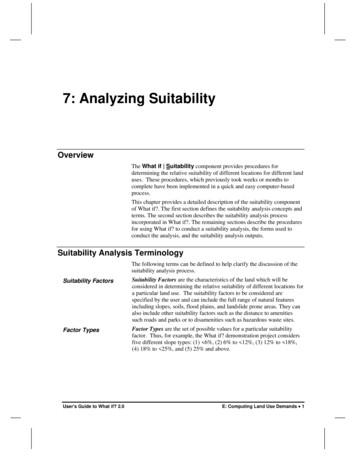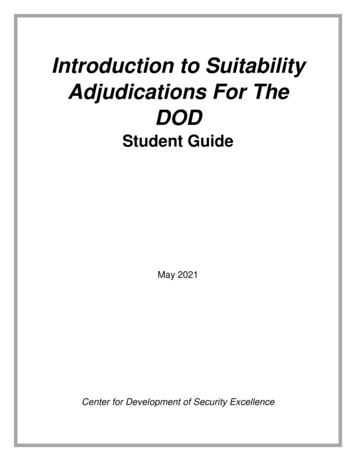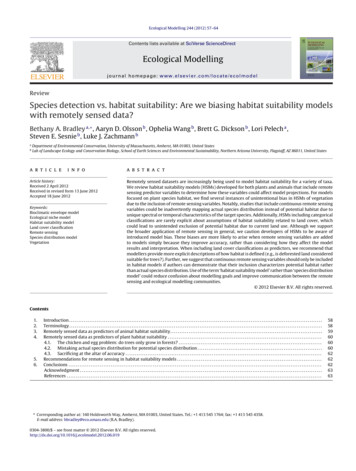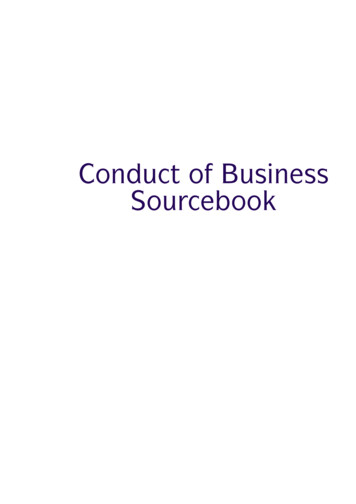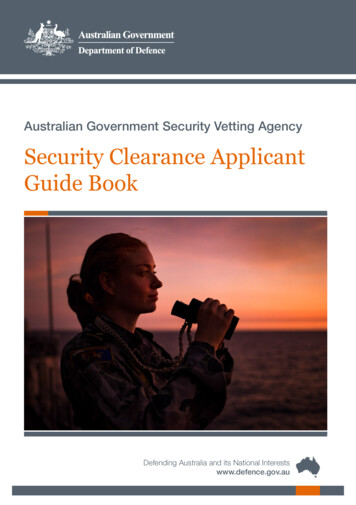
Transcription
Suitability ObligationsWhen Using SpecialistsJohn Duval, Sr. and Jack DuvalOctober 14, 2013
About the AuthorsJohn Duval, Sr. has a 30-year background in the financial services industry, including six years ofmanagement at the branch and district level. As part of his managerial experience, John managedthe Merrill Lynch New York City District Professional Resource Center, which included over 40product and service specialists serving over 700 representatives and their clients. In addition, he isa FINRA arbitrator as well as an industry expert witness in securities disputes.Jack Duval is the CEO of Accelerant, a securities litigation consulting firm. Jack has been involvedin the securities industry for 19 years, including working in the Merrill Lynch Private Client Group,running his own RIA firm, family office, and hedge fund.www.accelerant.biz ii
IntroductionThe specialist system has existed in the brokerage world since the 1980’s, however, it has notreceived a great deal of regulatory or expert commentary. This is remarkable since the use ofspecialists is common throughout the industry, particularly in the sales of complex products.This paper explores the suitability obligations of Registered Representatives and product specialistswhen jointly making recommendations to clients. The origin and evolution of the specialist systemis examined along with the functions typical of specialists. The industry distinction between “inside”and “outside” specialists is described, and selling agreements between Broker-Dealers (“BDs”) andoutside specialists are examined as well.Most importantly, a critical potential dilemma is explored in regards to suitability: what happensif the Registered Representative knows the client, the product specialist knows the product, butneither knows both?The answer, in short, is that the Registered Representative has ultimate responsibility for thesuitability of all recommendations to the client. However, if the Registered Representativeinvolves a specialist in the recommendation at any time, then both must know the client and theinvestment well enough to make a suitability determination. If either fails in this regard, then therecommendation cannot be said to be suitable.BackgroundIn the beginning of the 1980’s, many large BDs began to build what would later be called“financial supermarkets”, where their clients could get all their financial needs met at one location.This development resulted in the expansion of the range of offerings available: from traditionalinvestments such as stocks, bonds, and mutual funds; to life insurance and annuities, retirementplans, business loans, and mortgages, just to name a few.The enhanced complexity of these new platforms meant additional training was required forRegistered Representatives (hereafter “representatives”) and other associated persons of the BDs.However, even with training, the range of offerings was so broad (and some of them so technical)that it was not efficient or reasonable to expect any one representative to acquire and maintain acomplete knowledgebase on every product and service their firm offered.To address this reality, many BDs created a “specialist system”, whereby a given product expertwould support many offices of representatives. If a representative thought a particular productmight be appropriate for a client, she could call in the product specialist to assist in the clientevaluation and sale.The specialist system still exists today, even though some firms have moved away from thefinancial supermarket model. Most notably, the specialist system has expanded because of theincreasing complexity of investments such as structured products, variable annuities and variablelife insurance.www.accelerant.biz 1
What is a “Specialist”?Specialists serve a number of distinct functions within the brokerage world. Some of these include: Maintaining product or service expertise; Providing sales assistance to representatives, including meeting with clients; Educating representatives about products and related industry rules and regulations.While carrying out these functions, specialists are frequently called in by representatives to assistin large and complex transactions or to help explain complex products to clients. They are oftenbrought in early in the sales process to help determine suitability, go over product specifications,and meet with clients.Many specialists are involved with products that are issued with 100 page prospectuses oroffering memorandums. These documents are frequently replete with industry terms of art andrequire the simultaneous understanding of many different investment-related concepts. Thespecialist must not only have mastered the material but be able to explain the contents to both therepresentatives and their clients in plain English.Inside and Outside SpecialistsSpecialists can be divided into two primary types: “inside” and “outside”. In short, insidespecialists are employed by the same firm that employs the representative, and outsidespecialists are employed by third party firms or product issuers such as mutual funds and lifeinsurance companies.Many of the qualifications and functions of inside and outside specialists are identical, irrespectiveof their employer. For instance, if a specialist is involved in selling a registered product, thenthe specialist herself needs to be registered with FINRA, to the same extent required of therepresentative. Typically, a specialist will hold the Series 7 (General Securities Representative) orSeries 6 (Investment Company Products/Variable Contracts Limited Representative) license, andshould be familiar with the rules and regulations of the industry, including suitability.Inside SpecialistsAn inside specialist (also sometimes known as an “in-house” specialist) is employed by the sameBD as the representative and receives compensation consisting of a salary and bonuses based onthe volume of products sold within her respective business unit and territory. In addition to assistingin sales, they are frequently involved with training representatives about new product offerings.They also serve as an in-house resource for representatives who have questions about theirproduct specialty.Outside SpecialistsOutside specialists (which are also known as wholesalers) are typically employees of productissuers like mutual funds or life insurance companies. Similar to inside specialists, outsidespecialists also typically have geographic responsibilities and are compensated by a salary andbonuses based on the volume of products sold in their territory. A key difference is that an outsidespecialist will frequently be serving multiple BDs.www.accelerant.biz 2
Selling AgreementsSince outside specialists are not on the BD payroll, there necessarily exists a selling agreementbetween their third party employer/issuer and the BD. A closer look at the usual language foundin a selling agreement is an important step to understanding the relationship between the outsidespecialist, their firm, and the BD. A typical selling agreement will included the following elements: Compensation arrangements, including specific disclosure of gross commissions generated(by product or service) and percentage splits; The basis for commission reversals; Venue for dispute resolution in the event of a material disagreement; Term and length of contract; Conditions pertaining to appointment of representatives to sell their products.Chart 1, below, illustrates the interaction of both inside and outside specialists with the BD,representative, and client.CHART 1.Scenario 1Broker-DealerClientScenario RepresentativeProduct ant.biz 3
Suitability Obligations of SpecialistsSuitability can be described simply as matching an investment or strategy to the individual investors’particular facts and circumstances. In order to accomplish this, the representative must know boththe client and the investment.The suitability obligation is clearly spelled out in FINRA Suitability Rule 2111, which contains bothcustomer-specific and reasonable-basis components.3 FINRA Rule 2111 states, in part:(a) A member or an associated person must have a reasonable basis to believethat a recommended transaction or investment strategy involving a securityor securities is suitable for the customer, based on the information obtainedthrough the reasonable diligence of the member or associated person toascertain the customer’s investment profile. A customer’s investment profileincludes, but is not limited to, the customer’s age, other investments, financialsituation and needs, tax status, investment objectives, investment experience,investment time horizon, liquidity needs, risk tolerance, and any otherinformation the customer may disclose to the member or associated person inconnection with such recommendation.4The customer-specific suitability part of the rule is satisfied by the representative, and involvesthe suitability of recommendations as they relate to a specific customer’s unique facts andcircumstances. The reasonable-basis suitability part of the rule is fulfilled first by the member firmand then by the representative. Initially, this determination involves a due diligence investigation bythe member firm into the investment to determine if it should be offered to any of their clients.5The specialist can play an important role in the reasonable-basis due diligence process. Theyshould have deep industry knowledge within their specialty and could help their firm vet a newproduct. More frequently, the specialist helps the representative with her due diligence process bydetermining if a product is suitable for a particular client.Specialist-Client InteractionsA potential problem arises when the representative, who knows the client, and the specialist,who knows the product or strategy, come together to make a recommendation to the client. Therepresentative and specialist can both be assumed to know (respectively) the client and the product,but what if neither knows both? In such an instance, can a suitable recommendation be made?3 These obligations existed under FINRA Rule 2310 (Recommendations to Customers) and various Regulatory Noticesbefore FINRA Rule 2111. For more detailed analysis see Accelerant Whitepaper: Leveraged and Inverse ETFs: TrojanHorses for Long-Term Investors.4 FINRA Rule 2111. This rule replaced Rule 2310 (Customer Recommendations) and is effective from July 9, 2012.5 Id. at Supplementary Material .05 Components of Suitability Obligations.www.accelerant.biz 4
Very simply, the answer is no. We examine this question from the perspectives of both therepresentative and specialist, below.Representative Suitability Obligations When Working with a SpecialistIn short, the overall suitability obligation rests squarely on the shoulders of the representative. Thereis no way for a representative to disclaim any of the suitability obligations under Rule 2111,6 even if aspecialist is involved in the sale.The first priority of a representative is to know their client, which is done through what is knownas profiling. Indeed, the new FINRA Suitability Rule 2111 incorporates the phrase “customer’sinvestment profile” and imposes an affirmative duty upon the representative to gather certaincritical information, including: the customer’s needs; the customer’s investment time horizon; thecustomer’s liquidity needs; and the customer’s risk tolerance.7If the profiling process is not thorough, then the representative cannot be said to know the clientand a suitable recommendation cannot be made. However, merely knowing the client is notsufficient, the representative must also know the investment.How well must a representative know the investments she recommends? Well enough to makea suitability determination about that investment for her particular client. At the very least, herknowledgebase would include the following: Essential features; Investment risks; Liquidity considerations; Appropriate time horizon; Basic tax implications; Commissions and cost structure; Any surrender penalties or other exit fees.These basic details would need to be disclosed to the client as part of the recommendationprocess.However, even if the representative possesses knowledge of the basics listed above, a specialistmay still need to be brought in to explain certain features, considerations, or other complexities.6 Id. at Supplementary Material .02, Disclaimers.7 Id. An affirmative duty to profile the client has existed for representatives since January 1991 after Article III, Section 21(c) of the Rules (the predecessor to FINRA Rule 2310) was amended under FINRA NTM 90-52.www.accelerant.biz 5
Specialist Suitability Obligations When Working with a RepresentativeIf the specialist is an associated person8 with a FINRA member firm, and knows the client, thenthey have a clear suitability obligation under FINRA Rule 2111 for any recommendations. They canlearn about the client from a new account form, a financial plan, or other document containing clientprofile information, or from conversations with the investor and representative.As discussed above, the basic customer-specific facts the specialist would need to know, include: Age; Other investments; Financial situation and needs; Tax status; Investment objectives; Investment experience; Time horizon; Liquidity and cash flow needs; Risk tolerance;A key question for the applicability of the suitability rule to a specialist revolves around FINRA’sstandard of what constitutes a “recommendation”. FINRA has addressed this in the context ofonline trading firms issuing generic buy recommendations on stocks. A two-fold standard wasestablished to determine if a recommendation had been made (and thus would be subject to thesuitability rule):1. The communication must be a “call to action” to the client; and2. The more tailored the communication was to a client’s specific facts andcircumstances, the more likely it was to be a recommendation.9Very simply, if a communication is made to the client calling them to action, and the communicationwas made specific to the client’s particular facts and circumstances, then it is a recommendation.However, this standard creates two scenarios in which a specialist would not be subject to thesuitability obligation: The first is a situation where the specialist is not making a call to action to a client, but iscommunicating generically about a particular product or service to the representative. Suchscenarios could include: educational and training presentations; product “roll out” meetings;and general inquiries from representatives with non-client specific questions. The second is the rare case where a specialist meets with a representative and client todiscuss a product, is fully informed of the client’s specific facts and circumstances, but no callto action is ever made to the client to purchase the product.8 FINRA defines an associated person, in part, as “a natural person registered under NASD (now FINRA) rules ”See FINRA Rule 1011 (Definitions).9 See FINRA NTM 01-23 (Online Suitability).www.accelerant.biz 6
Importantly, the suitability obligation would be in effect if the specialist met with the representativeand client and the sale was consummated at a later date after other discussions or meetingswith the representative. In this scenario, the specialist’s participation would have been part of therecommendation and in contemplation of the call to action to the client.ConclusionIf a specialist is at any point involved in a recommendation to a client, then the specialist must knowenough about the client to make a suitability determination. Commensurately, the representativemust also know enough about the product to make a suitability determination. If either fails in thisregard, the recommendation made cannot be said to be suitable.Irrespective of specialist involvement, under FINRA Rule 2111 (and its predecessor, Rule 2310) theultimate responsibility for a suitable recommendation lies with the representative. The representativeknows the client better than anyone at her firm and is the one inviting the specialist in to help withthe sale. However, if the specialist is at any point involved in the recommendation to the client thenthe specialist is subject to the suitability rules as well.www.accelerant.biz 7
About AccelerantAccelerant (www.accelerant.biz) is a securities litigation consulting firm specializing in large andcomplex cases. We bring broad and deep securities and regulatory knowledge as well as analyticrigor to our work. Our experts have industry, academic, and regulatory experience which they bringto bear on all client matters.Accelerant’s clients value our ability to communicate complex ideas simply, our reputation forunbiased, independent and high quality analysis, and our commitment to a highly responsivework ethic.Headquartered in New York City, Accelerant also serves clients from our Hong Kong andLondon offices.ContactFor further information, please contact:Jack Duval CEOAccelerant800.231.3474jack@accelerant.biz 2013 Copyright Accelerant LLCwww.accelerant.biz 8
suitability of all recommendations to the client. However, if the Registered Representative involves a specialist in the recommendation at any time, then both must know the client and the investment well enough to make a suitability determination. If either fails in this regard, then the recommendation cannot be said to be suitable. Background

